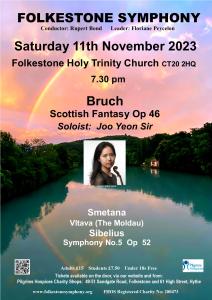Autumn Concert - Saturday, 11th November 2023

Smetana - Vltava (The Moldau)
Bruch - Scottish Fantasy in Eb major for Violin and Orchestra, Op. 46
- Soloist: Joo Yeon Sir
Sibelius - Symphony No. 5 in Eb major, Op. 82
Holy Trinity Church,
Sandgate Road,
Folkestone,
CT20 2HQ

Review
Folkestone Symphony Orchestra conducted by Rupert Bond performed its Autumn Concert in Holy Trinity Church, Folkestone on Remembrance Day, Saturday 11 November, and opened fittingly with a noble performance of the National Anthem.
The customary large audience was a tribute to this very popular local orchestra showcasing the wealth of musical talent in the area. The string section is larger now, balancing well with the woodwind and brass. Rupert Bond conducted with exemplary clarity and direction throughout.
The enterprising and beautifully constructed programme comprised contrasting late romantic nationalistic works from the later nineteenth and early twentieth century. The central work, Max Bruch’s Scottish Fantasy for Violin and Orchestra, Op 46, featured themes from Scottish tunes. This came between Smetana’s Vltava (The Moldau) and Sibelius’s Symphony No 5 in E flat major, Op 82 with their themes of countryside and rivers.
Smetana’s Vltava has a distinct written programme, describing the Czech river’s progress in tableaux from its source until it reaches full size and then flows beyond. This was a delightful start with gently murmuring flutes gradually joined by other instruments depicting the stream flowing down from its source, progressively growing into a larger stream, while the triangle created a magical splash effect. As the stream becomes a river the main theme enters, which later leads to a glorious climax. On the way it passes a wedding feast with a polka, which the orchestra articulated beautifully. The rapids were dramatically depicted by the brass, piercing piccolo and percussion with cymbal crashes. As the river disappears into the distance the music quietens until two loud chords suddenly pronounce the end of the piece.
The structure of Bruch’s work justifies the name ‘Fantasy’. Although it rivals the composer’s violin concerto in size and scope, it was wonderful to hear the less well-known work, especially when performed with such flair and sensitivity by Korean-born soloist Joo Yeon Sir. Bruch’s love of Scotland shines through his use of folk songs with their typical Scotch snap and pentatonic scale, nostalgic moods and choice of the violin as solo instrument. The soloist was highly impressive with her lovely tone, and a beautiful singing quality in the slow sections. This contrasted with her stunning virtuosity in the sparkling faster sections. The audience seemed spellbound as she played her soaring final cadenza leading to the work’s exuberant ending. The orchestra accompanied sympathetically, and the clever interweaving of Scottish tunes and interchanges between orchestra and soloist were well managed with a perfect balance. The audience enthusiastically applauded Joo Yeon’s superb performance.
Sibelius’s fifth symphony was written in the 1910s, with its third version, which is usually played today completed in 1919, but its style really belongs to the late 19th century. A solo French horn player introduces the symphony with the main motive, then is joined by others in the wind section. Tuning was challenging but mostly well handled. The rest of the orchestra enters, filling out the musical motives and building up tension in this extended movement, which comes to an abrupt end. The wind predominated again at the start of the second movement with pizzicato strings entering later in the lilting triple time. An interrupted cadence shortly before the end was sensitively played by the orchestra before another sudden but gentle close. The third movement has a bustling start which leads to the iconic ‘swan’ theme. Muted strings add to the atmosphere, while there are considerable demands on dexterity from the violins. This movement was also challenging for the brass section, who nevertheless performed with flair. The work’s ending, with its loud unexpectedly-placed chords interspersed with perfectly silent rests, demonstrated the cohesion and precision of this impressive orchestra.
This was another splendid concert by Folkestone Symphony that continues to mature in strength and ability under the orchestral leadership of Floriane Peycelon and conductorship of Rupert Bond, extremely talented musicians who foster pride among the local musical community for the orchestra’s achievements.
A final mention goes to Michael Lewis for his comprehensive and informative programme notes, which brought added enlightenment and musical insight to the evening’s performance.
Brinley and Janet Hughes
14 November 2023
